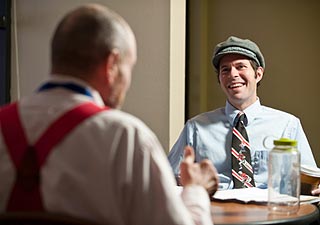Project helps seniors put lives on paper
How would you tell the story of your life?

Graduate student Mark Lounibos (right) listens to a story told by T.M. Dewitt (left) during a Life/Stories workshop at the Madison Senior Center in downtown Madison, Wis., on Nov. 13, 2009. Lounibos leads the free Life/Stories workshops for seniors each week, and the goal of the program is for participants to read and discuss biographies and literary narratives and then ultimately write their own stories.
Photo: Bryce Richter
Would you start at the beginning with childhood and your earliest memories, or jump in somewhere in the middle, with the most dramatic moment?
That’s what Mark Lounibos hopes to help his students — all over the age of 65 — figure out. Lounibos, a graduate student in English and an instructor at the UW–Madison Writing Center, leads a free weekly workshop — called Life/Stories — at the Madison Senior Center, just blocks from campus. The goal is for participants to read and discuss biographies and literary narratives and then ultimately write their own stories, and Lounibos hopes to build their final work into some kind of collection, either digital or printed.
The class sprung from conversations with his wife, a nurse who works with elderly patients. “Just talking to her and listening to the kinds of encounters that she has … is for me a reminder about a presence in this community that is often overlooked,” Lounibos says.
Murray, 79, has pictures in her mind, but with dyslexia she struggles to express them in writing. “I’d like to put it down for my grandchildren,” she says. “I don’t have anything from my grandparents except memories.”
His idea won a grant from Humanities Exposed (HEX), a Center for the Humanities program aimed at helping graduate students become “public scholars” who make a difference beyond campus by sharing their knowledge and talents through projects with community partners.
During one session, Lounibos reads his students the opening pages of the best-selling book “Into Thin Air,” which starts with the author on Mount Everest “straddling the top of the world.” The passage also foreshadows the story ahead, in which several climbers die.
“Now that’s really painting a picture,” says Jeanette Murray, one of his students, a former registered nurse. “I want to read the whole thing.”
Murray, 79, has pictures in her mind, but with dyslexia she struggles to express them in writing.
“I’d like to put it down for my grandchildren,” she says. “I don’t have anything from my grandparents except memories.”
She moved back to Wisconsin after fleeing Texas before Hurricane Ike destroyed her home on Bolivar Peninsula near Galveston. In her purse, Murray carries before-and-after photos of the house; all that was left after the storm were pilings sticking out of the sand.
Murray has always intended to tell her story. Among the possessions she lost was a shoebox full of scraps of paper with snippets and thoughts from her life she had jotted down over the years.
“My goal for coming here is direction … where, what and how?” she says during an October session of the workshop.
There is no single way to tell your life story, Lounibos says, but suggests Murray consider starting with the hurricane, since it was such a momentous event and connects to other aspects of her life, and focusing on small details of her experience.
But even with that direction, Murray is overwhelmed. “There’s just so much,” she says.
Mark sympathizes by talking about working on his dissertation, which he defends next semester. “It seems undoable,” he says. “Soon you’ve got a word, a sentence, a page.”
“This has been in my head a long time,” Murrays says. “Well, let’s get it out,” Lounibos says.
Three weeks later, she’s written four pages longhand on notebook paper, which she reads aloud. She starts out describing the plans she made to leave her home in September 2008 and then recounts driving seven hours to Marshall, Texas, with a friend to live in a motel.
“By Saturday evening, we began to realize our house was probably washed away,” she wrote.
Adam Carlson, a UW–Madison freshman planning to study nursing, was also there to listen and offer his thoughts, a useful perspective considering the audience Murray is writing for. Carlson volunteered to participate after Lounibos visited his English 100 class, part of the First-Year Interest Group “Health Care Systems in Contemporary America.”
After Murray finishes reading, Lounibos suggests she add more details about how she felt at various points of her journey. “Think of the details, think of the experiences, think of the people you interacted with.”
Carlson agrees it could use more detail, but also says, “I thought it was the beginning of a very good story.”
